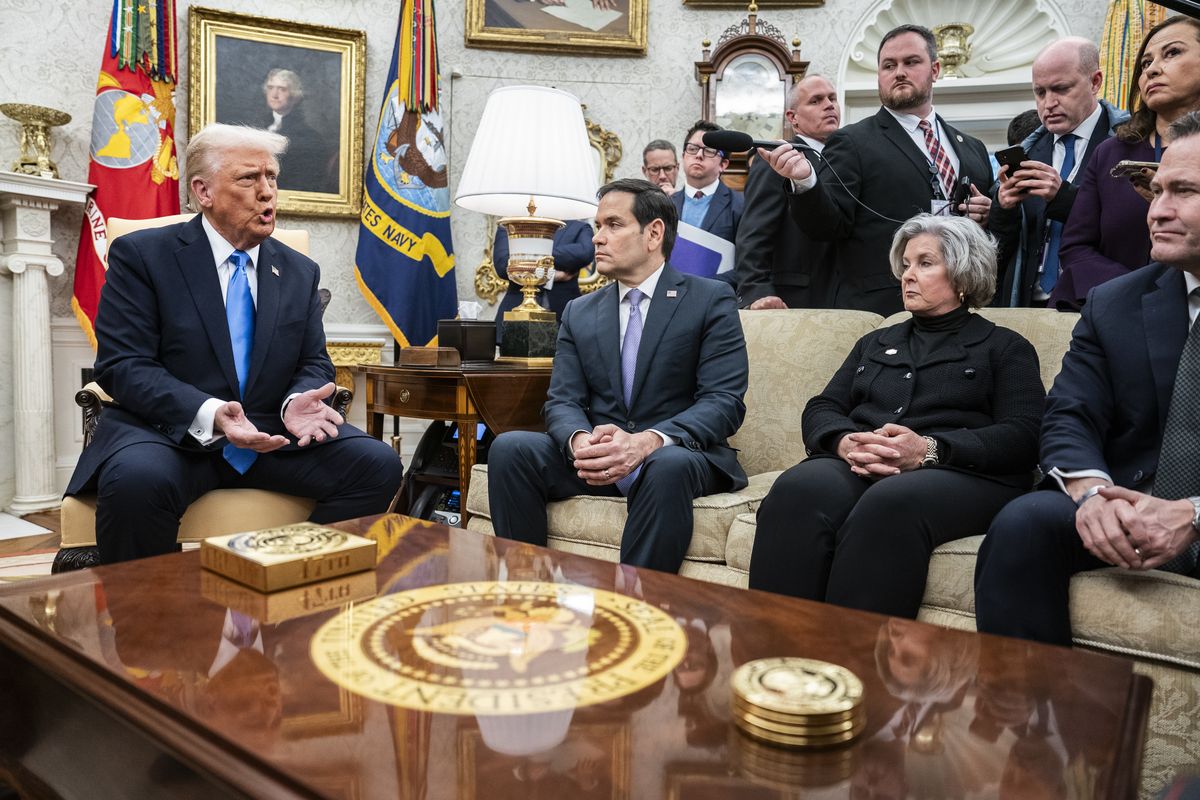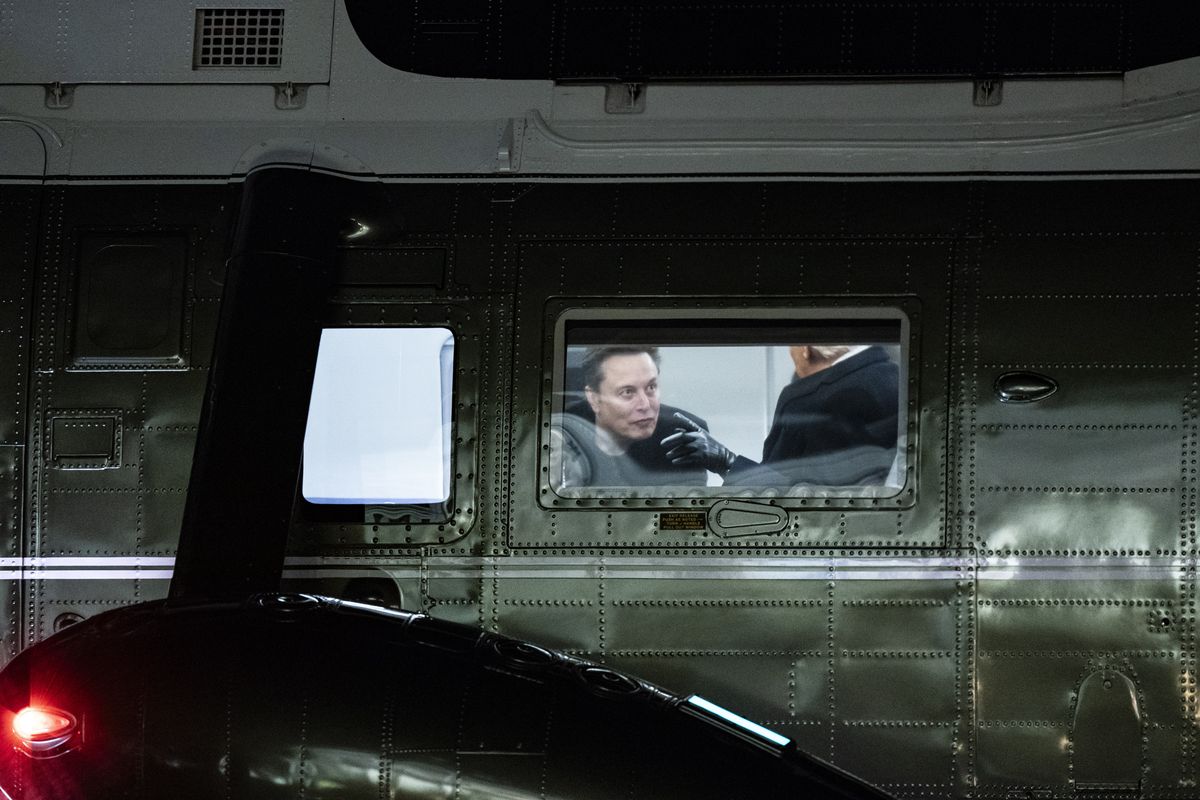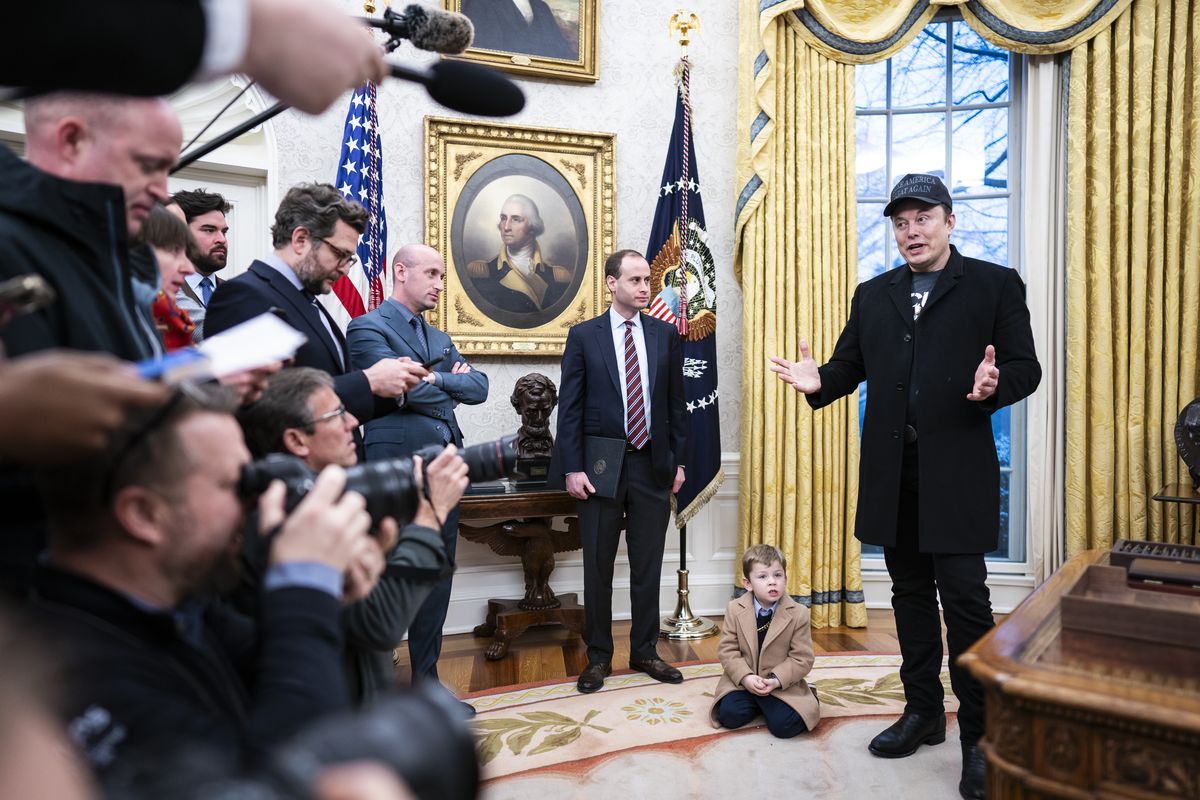Musk’s blitzkrieg is unnerving many of Trump’s senior advisers
Elon Musk, with his son, X, speaks with President Donald Trump and reporters in the Oval Office on Feb. 11 in Washington, D.C. (Jabin Botsford/The Washington Post)
Top Treasury officials have complained about disruption. The secretary of state has pushed back on staff cuts. Inside the Education and Health and Human Services departments, political appointees have been informed – not consulted – about canceled grants and contracts, sometimes learning about decisions from the media.
Elon Musk’s aggressive tactics to reshape the federal government have irritated and blindsided many senior officials in the Trump administration, including those tasked with running Cabinet departments being squeezed by his U.S. DOGE Service, according to interviews with more than 30 current and former officials and their advisers, many of whom spoke on the condition of anonymity to discuss internal matters. Amid these bubbling tensions, White House Chief of Staff Susie Wiles personally asked Musk last week to better coordinate on DOGE’s sweeping actions.
The broad goals of Musk’s team at DOGE, which stands for the Department of Government Efficiency, are shared by not just President Donald Trump, but most of his senior advisers, who also want to shrink the government through unilateral cuts. And yet agency heads Trump chose are finding themselves caught off-guard by DOGE’s actions and forced to reverse, mitigate or answer for some of its most disruptive moves. While working to win Senate confirmation to be health and human services secretary, for instance, Robert F. Kennedy Jr. had to reassure GOP senators he would re-examine DOGE-driven cuts to the National Institutes of Health. Linda McMahon, President Donald Trump’s nominee for education secretary, told senators that she, too, would investigate cuts at her department.
DOGE’s blitzkrieg across the federal government has sparked deep concern among civil servants, who have been targeted for layoffs and required to implement policies they see as unwise, if not illegal. But Trump’s political appointees are quietly expressing unease with Musk as well.
“Basically every Cabinet member is sick of him, but nobody feels like they’re in a position to do anything about it,” said one person who spoke on the condition of anonymity to describe private conversations with several incoming secretaries or their staffs. “People are afraid to cross him even as he’s wreaking havoc on their agencies.”
Trump, though, has made clear that he supports Musk. And none of the tensions with other appointees seem significant enough to block DOGE’s work.
In a joint interview aired on Fox News on Tuesday, Trump lavished praise on the billionaire and said Musk was ensuring his orders were not watered down by federal workers.
One of Trump’s few known complaints about Musk came after an Oval Office session last week to which Musk brought his toddler, who interrupted and gestured playfully while the men spoke with reporters, two people familiar with the matter said.
“When you sign these executive orders, a lot of them don’t get done,” Trump said on Fox. He said Musk would make sure they are implemented as intended: “Some guy that maybe didn’t want to do it, all of a sudden, he’s signing.”
The 78-year-old president and 53-year-old magnate have been seen together constantly since Trump’s victory in November. Musk has interviewed Cabinet picks, taken questions from reporters alongside the president and even joined Trump’s calls with world leaders. And he has made powerful allies in Stephen Miller, Trump’s deputy chief of staff, and his wife, Katie Miller, who has worked on behalf of DOGE.
In court filings, the White House has stated that Musk has no “actual or formal” authority to make decisions and is not a DOGE employee. In practice, however, DOGE’s ability to act even without prior approval from Cabinet secretaries illustrates how much power Musk has accrued.
“If you’re a generic Cabinet secretary, you might be looking at DOGE as limiting your ability to manage your agency, or feel you’ll look like a fool if you say X and DOGE does Y. You might find that annoying, and that’s understandable,” said Avik Roy, president of the Foundation for Research on Equal Opportunity, a think tank that promotes free markets. “But Trump likes the fact that these Cabinet heads don’t have carte blanche to do whatever they want and that Musk gives them another set of eyes at the agencies. That’s what the president wants, and he’s entitled to run the executive branch that way.”
But the extent of Musk’s ability to execute sweeping changes without approval or input from department heads appears to be unprecedented – and unsettling for the Cabinet.
“Why do you want to be a Cabinet secretary if you can’t run your own agency and the president and Elon Musk run your agency for you? That doesn’t seem like a great job to me. It’s very unusual. We’ve never seen anything like this,” said Doug Holtz-Eakin, president of the American Action Forum, a right-leaning think tank. “These uncoordinated efforts have downsides – you have the secretaries and DOGE at cross-purposes, and that doesn’t serve anyone well.”
A White House spokesman said there’s no tension between Musk and other officials, and other Trump officials downplayed any disagreement.
“The entire Trump administration is aligned on delivering on President Trump’s agenda to streamline our bloated government and make it more efficiently serve the American people,” spokesman Kush Desai said in a statement. “DOGE is working hand in hand with the White House and federal agencies to identify and slash waste, fraud, and abuse at lightning speed. Any unfounded rumors peddled by anonymous sources simply do not have any clue what’s happening or are actively working against the President’s agenda and the will of the American people.”
DOGE clashes with agencies
Almost as soon as Treasury Secretary Scott Bessent took office, the DOGE team thrust his department into the spotlight.
David A. Lebryk, the most senior career official at Treasury, had clashed with DOGE allies who demanded access to sensitive payment systems that disburse more than $5 trillion annually so they could unilaterally terminate foreign aid payments. Lebryk thought that was illegal and resigned.
Just a few days after being sworn in, Bessent began to hear from peers about how valuable Lebryk was. In a call, Federal Reserve Board Chair Jerome H. Powell, a former Treasury official himself, extolled Lebryk as a valuable public servant, two people said, although that was not the primary purpose of the conversation. Several other former senior Treasury officials made similar points in separate calls with Bessent’s deputies around the same time, two other people said. The incident touched off broad alarm among the Treasury civil staff that secretaries depend on to manage their agencies, and even among Republicans who had served in the department.
The controversy around DOGE’s access to the payment network threatened to undercut the treasury secretary’s credibility as well. Bessent later told congressional Republicans that Musk’s team did not control the payment systems, and department officials said in a public statement that DOGE staffers only had “read-only” access. An affidavit filed in federal court from a senior career Treasury staffer said 25-year-old Marko Elez had, in fact, been granted editing permissions that were later revoked. Top Treasury officials later expressed frustration to confidants that the matter weakened their standing with the department, two people familiar with those comments said.
“It undermined him with the Treasury staff and made him look like he was not in control,” one former Trump administration official said.
On Bloomberg News on Thursday, Bessent compared Musk to star athletes Michael Jordan and Lionel Messi and praised DOGE’s work, which Treasury has said publicly it is supporting.
“He is focused, and his energy level is unbelievable,” Bessent said of Musk. “He has gotten to where he has because everything is on the table.”
Bessent is not the only Trump Cabinet secretary to have to manage fallout from Musk’s aggressive approach. Other political appointees have been left in the dark about key initiatives in their own departments – or forced to try to reverse Musk’s maneuvers.
During Secretary of State Marco Rubio’s first official foreign trip, DOGE representatives in Washington presented a plan to eliminate almost all of USAID, which Rubio was nominally running as acting administrator. The plan proposed cutting the 10,000-people agency to roughly 290, a staffing level so low that experts said it would be impossible to administer the tens of billions of dollars of foreign aid approved by Congress every year.
Rubio and his aides, who during his trip to Central America vowed that foreign aid would continue, advocated for more USAID officials to keep their jobs, resulting in 600 workers being deemed essential – roughly double what the DOGE team originally proposed.
But the Trump administration’s aid freeze still left chaos across the agency, the world’s largest provider of food assistance. In public, Rubio forcefully defended Musk and blamed USAID officials for “insubordination” in DOGE’s effort to audit the agency. But in more private settings with U.S. officials, Rubio has acknowledged that it’s much easier to smash things than put them back together, a point underscored by nonprofit groups that have struggled through the freeze to protect programs the Trump administration says it still supports, said current and former U.S. officials.
A spokeswoman for the State Department did not respond to requests for comment.
“The secretary is trying to make foreign aid work better, but much of the current DOGE actions inside and outside of Foggy Bottom are focused on ending it,” said Matthew Bartlett, a political appointee at the State Department during Trump’s first term.
A seized office and a white noise machine
In the first days after Trump’s inauguration, the offices on the seventh floor of the Education Department were mostly empty, waiting for senior political officials who require Senate confirmation to arrive. But at least one political appointee had found an office and started to settle in, said one person with knowledge of the situation.
Then, the DOGE team that arrived at the agency Jan. 31 abruptly commandeered that office. DOGE staffers refused to interact with others – declining even to return pleasantries or acknowledge greetings – and got into at least one altercation with a political appointee, this person said. The DOGE team also took possession of the large, windowed corner office meant for the agency’s undersecretary, dragging extra desks and chairs in to set up a war room. Also set up: white noise machines, to prevent others from hearing their conversations.
The DOGE team has made almost all of the decisions about what grants and contracts to cancel and which employees to put on leave, without seeking or considering input from political appointees on-site, people familiar with the situation said.
In many cases, political appointees are hearing about cuts at the same time as the public is – via DOGE or Musk posts on X, the social media network the billionaire owns.
The political appointees “had a plan in place for how they wanted the first couple of weeks or months to go, and this is just derailing it,” one person said. The team’s members, this person said, did not realize that they would have to “fight this battle.”
DOGE’s decisions included putting employees on leave because of alleged ties to diversity, equity and inclusion initiatives – even if all they did was participate in a DEI program that had been endorsed by the first Trump administration. DOGE also canceled contracts for functions mandated by law and killed others in which the agency had already paid out most of the money. Many contracts will need to be rebid – a time-consuming and avoidable process, people familiar with the situation said.
McMahon, who is still awaiting Senate confirmation, has heard these complaints from political staff and has been frustrated by the situation, according to someone close to her.
“She’s frustrated because she’s going to have to come in and clean up a big mess,” this person said. He expects McMahon will tell DOGE to operate differently, saying she would probably explain: “Make recommendations, and then I will decide. You can no longer come in and cut and strike and delete.”
Asked for comment, an Education Department spokeswoman provided a statement from the agency’s chief of staff, Rachel Oglesby, who said DOGE team members were a valuable part of the department’s work. “We all serve at the pleasure of President Trump and are working to implement his agenda together,” she said. “Any reports to the contrary are inaccurate, unnecessary and unhelpful to accomplishing our shared goals.”
DOGE also descended at the Department of Health and Human Services, where it embedded several agents in what it says is an effort to root out waste and fraud in the agency’s nearly $2 trillion budget. Musk’s team has repeatedly surprised political officials who weren’t aware of DOGE’s plans or the extent of the group’s planned cuts, and they have sometimes learned of actions only from news reports.
Some Trump appointees were caught off-guard by a Friday night announcement on Feb. 7, driven by DOGE, that the National Institutes of Health would cut billions of dollars in payments to universities and research organizations, said two people familiar with the matter. That move also prompted complaints from GOP leaders worried about the impact on higher education and jobs in their states – leading Kennedy, who had not yet been confirmed as HHS secretary, to assure GOP senators he would review the policy.
The White House declined to comment on whether officials were briefed on DOGE’s specific actions such as NIH funding cuts.
‘DOGE is by definition disruptive’
Many of these complaints have found their way to the White House. But Trump has made clear his support for DOGE, limiting the options for constraining Musk’s power.
Last week, Wiles, the chief of staff, spoke privately with Musk near the East Room of the White House, two people familiar with the exchange said. But Wiles did not reprimand Musk or give him a list of demands – she just asked for improved coordination between DOGE and White House staff, people familiar with the conversation said. Some details of that talk were previously reported by Reuters.
A White House official said that lines of communication between the two have already improved. Musk traveled with Trump during a leg of his trip to Florida this past weekend, and on the plane, Musk ran things by Wiles and didn’t go into Trump’s office without letting her know.
“To be crystal clear, DOGE is by definition disruptive, so it’s normal and expected for Wiles to have some back and forth with Musk as he goes along,” said a senior administration official.
Democrats have long predicted a split between Musk and Trump, arguing that a falling-out between such large personalities is inevitable. Even many of Trump’s aides have wondered when or if the president will tire of sharing the spotlight with Musk, the richest person in the world.
“The conversation at Mar-a-Lago in late December was already, ‘Why is DOGE getting all this attention and credit?’ ” one person familiar with the dynamic said.
But others emphasize the men’s shared personal and ideological affinity. On Fox News, Trump referred to Musk as “brilliant” and marveled at his “tremendous imagination.” Musk was similarly complimentary of Trump: “Not once have I seen him do something that was mean or cruel or – or wrong. Not once.”
Nonpublic polling has shown that Americans’ negative feelings toward DOGE don’t affect Trump’s poll numbers, according to a White House official. A Washington Post-Ipsos poll found that 43% of Americans support what Trump has done in his first month, while 48% oppose it. But Musk’s polling is worse: Only 34% approve of how he’s handling his job, while 49% disapprove.
Allies say Trump believes Musk played a crucial role in the 2024 presidential election, especially turning out voters in key states, and is doing necessary work to weaken the federal civil service that has resisted Trump’s agenda. While DOGE has irritated Trump aides by generating nearly daily chaos in the capital, the president sees that disruption as a strength, not a weakness. Musk, meanwhile, has said Trump offers a generational opportunity to save the American government – and pave the way for his goal of getting to Mars.
“Trump understands that you can’t take on the establishment with a scalpel. If you take on the system with a scalpel, the system will break you,” said Newt Gingrich, who served as speaker of the House in the 1990s and is a Trump ally. “Trump understands he needs a sledgehammer. Elon is that sledgehammer.”


